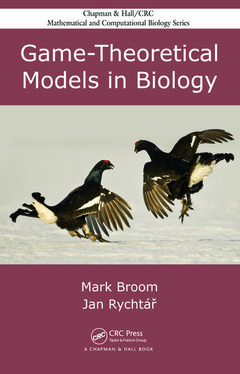Description
Game-Theoretical Models in Biology
Chapman & Hall/CRC Mathematical Biology Series
Authors: Broom Mark, Rychtar Jan
Language: English
Subjects for Game-Theoretical Models in Biology:
Keywords
Cellular Automata; evolutionary game theory; Ideal Free Distribution; mathematical models of biological situations; Hawk Dove Game; modeling of biological phenomena; Strategy S1; applications of game theory to biology; Matrix Games; evolutionarily stable strategy; Pure Strategy; hawk-dove game; Mixed Ess; matrix games; Extensive Form Games; game theoretical modeling; Replicator Dynamics; Mathematical Biology; Payoff Matrix; kleptoparisitism; Sperm Competition; Nash Equilibrium; Non-generic Case; Adaptive Dynamics; Iter
Approximative price 80.69 €
In Print (Delivery period: 13 days).
Add to cartSupport: Print on demand
Description
/li>Contents
/li>Biography
/li>
Covering the major topics of evolutionary game theory, Game-Theoretical Models in Biology presents both abstract and practical mathematical models of real biological situations. It discusses the static aspects of game theory in a mathematically rigorous way that is appealing to mathematicians. In addition, the authors explore many applications of game theory to biology, making the text useful to biologists as well.
The book describes a wide range of topics in evolutionary games, including matrix games, replicator dynamics, the hawk-dove game, and the prisoner?s dilemma. It covers the evolutionarily stable strategy, a key concept in biological games, and offers in-depth details of the mathematical models. Most chapters illustrate how to use MATLAB® to solve various games.
Important biological phenomena, such as the sex ratio of so many species being close to a half, the evolution of cooperative behavior, and the existence of adornments (for example, the peacock?s tail), have been explained using ideas underpinned by game theoretical modeling. Suitable for readers studying and working at the interface of mathematics and the life sciences, this book shows how evolutionary game theory is used in the modeling of these diverse biological phenomena.
Introduction. What Is a Game? Two Approaches to Game Analysis. Some Classical Games. The Underlying Biology. Matrix Games. Nonlinear Games. Asymmetric Games. Multi-Player Games. Extensive Form Games and Other Concepts in Game Theory. State-Based Games. Games in Finite and Structured Populations. Adaptive Dynamics. The Evolution of Cooperation. Group Living. Mating Games. Food Competition. Predator-Prey and Host-Parasite Interactions. Epidemic Models. Conclusions. Appendix. Bibliography. Index.
Mark Broom is a professor of mathematics at City University London. For 20 years, he has carried out mathematical research in game theory applied to biology. His major research themes include multi-player games, patterns of evolutionarily stable strategies, models of parasitic behavior (especially kleptoparasitism), the evolution of defense and signaling, and evolutionary processes on graphs. He received his PhD in mathematics from the University of Sheffield.
Jan Rychtář is an associate professor of mathematics at the University of North Carolina at Greensboro, where he helped start a math-biology research group involving faculty and students from the biology and mathematics departments. He works on game theoretical models and mathematical models of kleptoparasitism. His recent research themes focus on models of brood parasitism in dung beetles, models of mate selection in honey bees, and evolutionary processes on graphs. He received his PhD in mathematics from the University of Alberta.
These books may interest you

Game TheoryAn Introduction, Set 145.60 €


